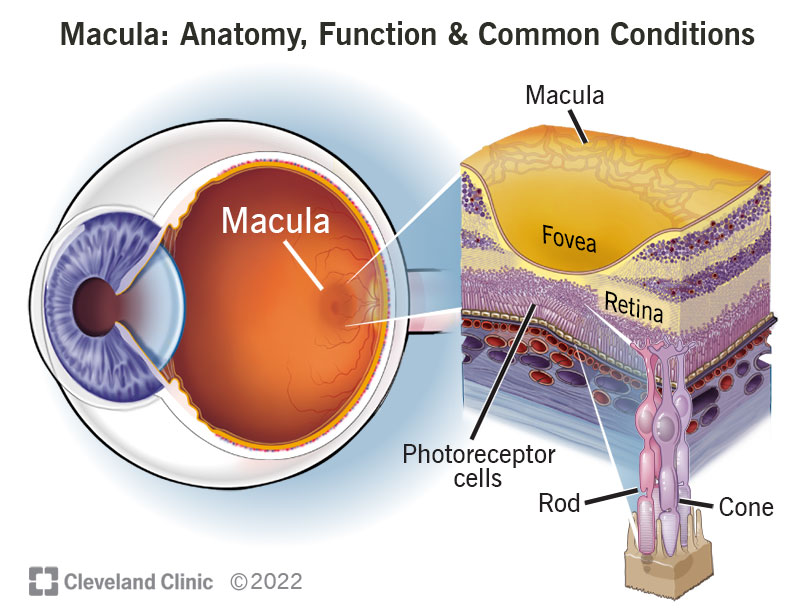The macula lets you see small details and focus on very specific aspects of what you’re looking at. Visit your provider as soon as you notice any changes in your vision. The sooner you have an issue diagnosed, the less likely it is to cause serious damage to your eyes.
Advertisement
Cleveland Clinic is a non-profit academic medical center. Advertising on our site helps support our mission. We do not endorse non-Cleveland Clinic products or services. Policy

Image content: This image is available to view online.
View image online (https://my.clevelandclinic.org/-/scassets/Images/org/health/articles/23185-macula)
The macula is the part of your eye that processes what you see directly in front of you (your central vision). It’s part of your retina and is key to your vision.
Advertisement
Cleveland Clinic is a non-profit academic medical center. Advertising on our site helps support our mission. We do not endorse non-Cleveland Clinic products or services. Policy
The macula is the round area at the center of your retina, at the back of your eyeball. Another name for the macula is the macula lutea.
Anything affecting your macula can cause your vision to get worse. That’s why you should see your eye care specialist right away if your eyes or vision suddenly change.
The macula (like the rest of your retina) translates light that enters your eye into the images you see. It’s responsible for your central vision that lets you see objects directly in front of you.
Light passes through the lens at the front of your eye and hits the retina. Photoreceptors — cells inside your retina that react to light — change light energy into an electrical signal. This signal travels through your optic nerve and into your brain to become the picture of the world you see.
Your macula handles the most specific parts of images directly in front of you. It helps you understand specific details like:
The macula lets you see small details and focus on very specific aspects of what you’re looking at. Like the rest of your retina, the macula converts light into a signal your brain can process and understand.
Advertisement
If your whole retina processes information like a spray from a garden hose, then your macula is an eye dropper that focuses on a very specific amount of information (the small details and what’s right in front of you).
Without a macula — or with a damaged macula — your eye might still function (it would still take in light), but your vision would be blurry and lack details.
The macula is the center of your retina; the thin, light-sensitive layer at the back of your eye. It’s a round, yellow spot that has a slight oval shape. Most people’s maculae are only 5 millimeters (less than 1/4 of an inch) wide.
The macula (and the rest of your retina) is made of photoreceptor cells. Within these cells are rods and cones.
Rods are photoreceptors that process black and white light. They also help you see at night and in dim light. Cones process color and make up most of your usual vision. Both types of cells work together to give a clear, accurate picture of what you’re seeing.
The macula has a high concentration of cones, which help you process the details in your vision.
Any condition that damages your eye can affect the macula. Conditions that specifically affect the macula include:
Issues that affect your whole retina can harm your macula, as well, including:
Talk to your healthcare provider if you notice any symptoms in your eyes, including:
Your provider will check your maculae (plural of macula) as part of your overall eye exam. Usually, they’ll need to examine your macula with an ophthalmoscope, a special tool that lets them see into your eye and examine all its parts.
Tell your healthcare provider about any changes in your vision. If you wear glasses or contact lenses, get an eye exam regularly so your provider can adjust your prescription as often as necessary.
Make sure you’re wearing proper eye protection for any sport or activity that could cause an eye injury. Wearing sun protection and taking care of your overall health can help take care of your maculae, as well.
See your healthcare provider as soon as you notice any changes in your vision. Whether it’s something as simple as needing new glasses, or a more serious condition, don’t wait for symptoms to get worse before having your eyes checked.
Advertisement
Go to the emergency room if you suddenly lose your vision or have severe eye pain.
The macula is a tiny part of an already small piece inside your eye, but it plays a huge role in your ability to see clearly. You use it constantly, whether or not you’ve ever thought about it. Get your eyes examined regularly to make sure your macula (and the rest of your eye) is healthy. Visit your provider as soon as you notice any changes in your eyes. Even a little change can be a sign of something that might affect your vision later on.
Advertisement

Sign up for our Health Essentials emails for expert guidance on nutrition, fitness, sleep, skin care and more.
Learn more about the Health Library and our editorial process.
Cleveland Clinic’s health articles are based on evidence-backed information and review by medical professionals to ensure accuracy, reliability and up-to-date clinical standards.
Cleveland Clinic’s health articles are based on evidence-backed information and review by medical professionals to ensure accuracy, reliability and up-to-date clinical standards.
Getting an annual eye exam at Cleveland Clinic can help you catch vision problems early and keep your eyes healthy for years to come.
